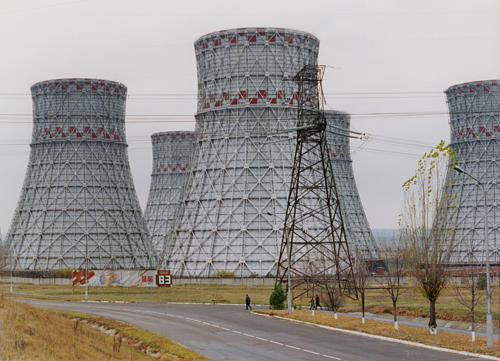
Azerbaijan’s participation in the Nuclear Security Summit in the US is very important in terms of counteracting the current threats for the whole South Caucasus region. During the summit, Azerbaijan raised a very serious issue related to the nuclear security of several countries in the region.
Azerbaijan’s Foreign Minister Elmar Mammadyarov met with the Director General of the International Atomic Energy Agency (IAEA) Yukiya Amano and discussed the threats caused by the operation of the outdated ‘Metsamor’ nuclear power plant located in Armenia.
Baku, for many years, has been saying at all international platforms that the operation of ‘Metsamor’ plant poses a serious threat, since it was constructed with old technology and its service life has expired. Additionally, this nuclear power plant is located in the earthquake-prone region of South Caucasus and this makes its operation even more dangerous.
The accident at Japan’s newest nuclear power plant in Fukushima, caused by an earthquake in 2011, led to a huge environmental disaster. It is scary to think what will happen in the case of a quite possible earthquake in Armenia, for example, similar to the one that happened in the country’s Spitak city in 1988.
In September 2015, the then Minister of Energy and Natural Resources of Armenia Yervand Zakharyan said that serious work on the construction of a new nuclear power plant in the country won’t be held in the coming years. It’s obvious why Yerevan cannot reconstruct the old nuclear power plant – permanent financial problems and conflicts with neighbors.
The desire of the authorities to use the Metsamor nuclear power plant for many years is quite clear, considering the fact that Armenia hasn’t spent a dime on its construction and hence the energy generated by the plant can be sold to the country’s population for a knockdown price over a long period of time.
However, frankly speaking, one must admit that even the reconstruction wouldn’t help the Armenian nuclear power plant. The plant’s exploitation period has ended.
Today, all the countries in the region, including Iran, Turkey, Georgia, Russia and Azerbaijan are exposed to the threat of suffering the same fate of the Chernobyl nuclear power plant, Sayano-Shushenskaya hydropower plant and the Japanese Fukushima nuclear power plant.
Rather than shut down an old Metsamor nuclear power plant, which is located in a seismic zone, the Armenian government decided to extend its service life for a few more years.
The government’s decision was made despite the fact that, according to experts, the nuclear power plant could operate only until 2016 in the worst-case scenario, although the EU has been insisting on its shutdown for many years and was even ready to allocate $200 million for its conservation.
And yet, Armenia, which has recently faced multi-day protests due to an increase in energy tariffs, understands that a new expensive nuclear power plant will not cover its cost for many years to come. According to various estimates, a new unit will cost from $5 billion up to $7 billion. This is unreal money for the poor country, blocked by two of four neighboring countries.
Yerevan even took a loan worth $300 million from Russia for the reconstruction of the nuclear power plant by the Russian State Atomic Energy Corporation (Rosatom). Armenia is unlikely to find an investor willing to put up money for the project.
The reason is that the country’s top officials are fully corrupted and money, as all previous tranches, will be distributed among representatives of Armenian President Serzh Sargsyan’s clan and his fellow oligarchs.
Azerbaijan and other countries in the region must continue drawing attention to a huge probability of technical accidents. As a result of these accidents, the region can be subjected to radioactive contamination.
Perhaps, President Sargsyan’s participation in the Nuclear Security Summit in Washington will serve as a starting point for solving the problem of the Metsamor nuclear power plant as there are no other reasons for his presence at the summit.
—
Elmira Tariverdiyeva is the head of Trend Agency’s Russian news service
Trend
